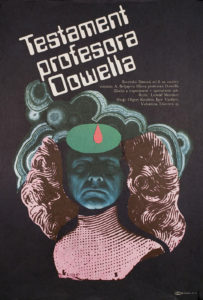 If you ask me, one simply cannot get enough head-in-a-dish movies! Then again, maybe I’m wrong…here’s a fairly late entry into the cycle, a Russian flick from 1984 that adds nothing new or interesting to the subgenre. In other words, you’re better off rewatching RE-ANIMATOR!
If you ask me, one simply cannot get enough head-in-a-dish movies! Then again, maybe I’m wrong…here’s a fairly late entry into the cycle, a Russian flick from 1984 that adds nothing new or interesting to the subgenre. In other words, you’re better off rewatching RE-ANIMATOR!
It’s possible I might have enjoyed this film more if I hadn’t already read Alexander Belyaev’s source novel PROFESSOR DOWELL’S HEAD (or GOLOVA PROFESSORA DOWELYA, which appeared in an English translation in 1981). Originally published back in the thirties, the book is an irresistible slice of pulp fiction by Russia’s top sci fi author (Belyaev’s other works include the source material for the Soviet classic AMPHIBIAN MAN), and has apparently become one of the country’s most beloved genre novels. While extremely archaic in most respects, the book is nonetheless concise, fast-moving, wildly imaginative and lots of fun. The film version, PROFESSOR DOWELL’S TESTAMENT (ZAVESHCHANIYE PROFESSORA DOUELYA), which appeared over fifty years later, is none of those things.
Professor Dowell is a scientist toiling in a secluded laboratory in the tropics. He’s been conducting experiments on animals in a quest to find the secret of immortality. Dowell, it seems, has nearly reached his goal, but is killed in a car accident.
Dowell’s uppity assistant Dr. Korn caused the accident, and is looking to use the professor’s discoveries for his own diabolical ends. This he does by severing Dowell’s head and keeping it alive through state-of-the-art methods developed by the professor. Korn also utilizes a Dowell-created mind probe he hopes will divulge his master’s secrets.
Meanwhile, Professor Dowell’s grown son is prowling the area, convinced his father’s death was no accident. He falls in love with a pretty local woman, but she’s killed in a nightclub shootout. Her body, however, proves useful to the ever-scheming Korn, who manages to do what Professor Dowell never managed: he attaches it to another woman’s head, in which state it lives, breathes and talks. Not that this fools Dowell’s son, who recognizes his lover’s body immediately, even if she is wearing a different head!
From there events follow their inevitable course as Dowell’s son and his beloved become determined to expose Korn’s dastardly machinations. In the end, however, it’s Dowell himself, or more accurately his head, that does the exposing, appearing on a TV screen at a scientific conference meant to tout Korn and his innovations. Professor Dowell’s head explains that scientific discovery means nothing unless it’s done with love for one’s fellow man…and then promptly expires.
Despite the accomplishments of Soviet filmmakers like Tarkovsky, Klimov, Shepitko, etc., Russian cinema in 1984 was still in a state of infancy, at least compared to that of much of the rest of the world. The cheap photography, low rent special effects and amateurish performances of PROFESSOR DOWELL’S TESTAMENT all attest to that fact. Sometimes such a primitive approach can work to a film’s advantage, but not in this case. Another liability is the predictable storyline, which collapses the twisty, energetic narrative of the Belyaev novel into a slow-moving morass. As if all that weren’t enough, the film is also saddled with a horrendous up-tempo score that wouldn’t feel out of place in an eighties sitcom.
All in all a lackluster piece of work. The only bright spot is the fact that in recent years Soviet genre cinema has improved markedly (see the ‘04 Russian horror/sci fi blockbuster NIGHT WATCH)—that’s scant consolation, however, for those unfortunate enough to sit through PROFESSOR DOWELL’S TESTAMENT!
Vital Statistics
PROFESSOR DOWELL’S TESTAMENT (ZAVESHCHANIYE PROFESSORA DOUELYA)
Lenfilm Studio
Director: Leonid Menaker
Screenplay: Leonid Menaker, Igor Vinogradsky
(Based on a novel by Alexander Belyaev)
Cinematography: Vladimir Kovzel
Editing: Irina Rudenko
Cast: Olgert Kroders, Igor Vasilyev, Valentina Titova, Natalya Sajko, Aleksei Bobrov, Nikolai Lavrov, Aleksandr Porokhovshchikov, Ernst Romanov, Boris Tsymba, Pyotr Shelokhonov
